#upon reading i thought
Text
it's,, that feeling when you're reading a book/playing a game/watching a movie/whatever and it. contains another one of your interests. so it's an interest within an interest. which is so exciting.
#the secret history#if we were villains#i love when that happens so much#i have found myself in heaven#upon reading i thought
20 notes
·
View notes
Text
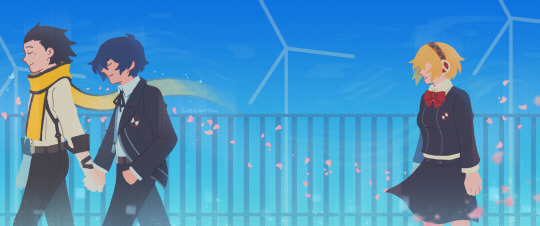
reunion 🌸
#persona 3#persona 3 spoilers#minato arisato#makoto yuki#ryoji mochizuki#aigis#ryomina#lizzy does art#HELLO EVERYONE!!! march 5th is upon us again so i bring... my contribution for this year. my third year drawing for it!#i made the thumbnail for this a few weeks after last year's graduation day#i thought it would be fun to lean into the ryominaigis angle of graduation day (you could read this as minato/aigis if you like-#but i feel like most people would read it as ryoji/minato)#IN ANY CASE working on this made me very emotional over this game :') (specifically minato)#i really enjoy how p3 ends it's such a nice way of wrapping up the narrative's messages and themes#working on this. minato's kindness was at the forefront of my mind throughout the piece#and i really wanted to capture how. ultimately it was his decision to sacrifice himself- to do the great seal#while to an outsider's perspective it is. sad that minato passes. i think becoming the seal is something that minato-#actively welcomes. in the same way that death (ryoji) is a comfort to him because death was housed in him for Ten YearsTM#AND I ALSO GOT REALLY SAD OVER AIGIS TOO. i still get fucked up over how in fes's animated cutscene for 3/5 they portray-#her as human and not drawing the robot parts so i wanted to do something smilar here...#but also i am very sad on aigis's behalf because she discovers her humanity through minato and realizes what she-#wants to do and then. well. minato is like. he's ready to pass on (even if he's scared) and im like. OH MY GOD THIS TRIO GETS ME MESSED UP#this was more coherent in my head LOL BUT ough i like drawing p3 and working through my feelings about it...#anyway! happy (in quotations) march 5th. i love this game to bits. it's so fun to draw for this day every year and see how i've improved#if you've read all this thank you :) lizzy appreciates you all very much. mwah! <3
1K notes
·
View notes
Text

I'm sorry,
WHAT?!
#of all the universes I never thought would be expandes upon#or revisited#The Last Unicorn was definitely pretty high on that list#guess it's time for me to add the original book to my reading list
15K notes
·
View notes
Text
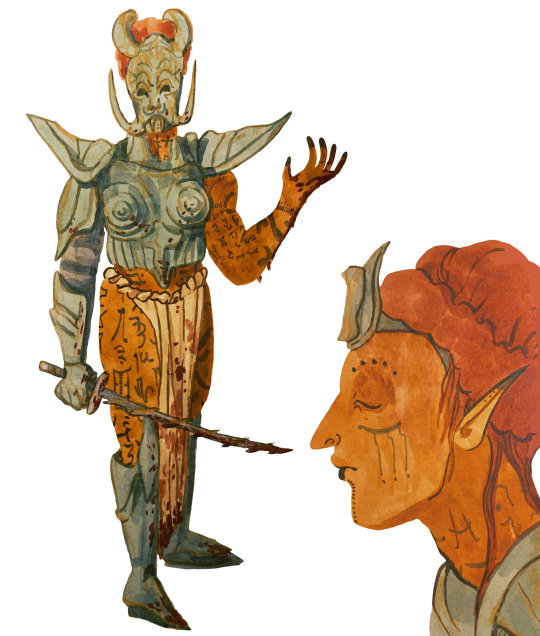
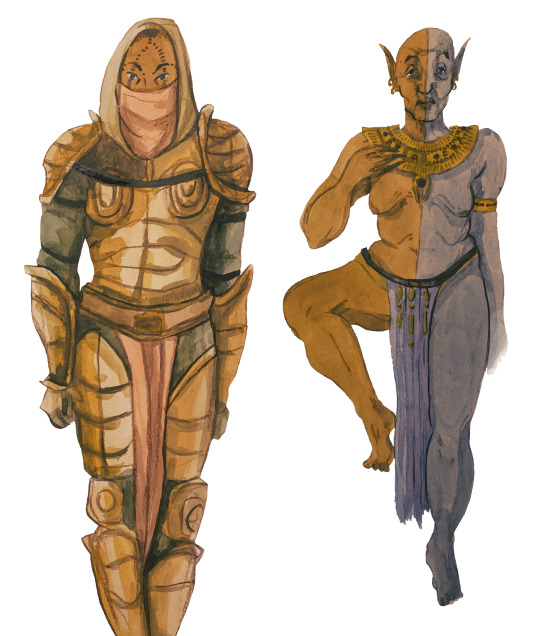
girlbossing too close to the sun.
#art#ive literally just been treating this game as a library simuator#i walk from bookseller to bookseller opening up all of their books#vivecs sermons are either a highlight or the point at which i stop reading#ive been trying to convince the ordinators that imitation is the highest form of flattery but it hasnt been working#let me wear your helmets please theyre so funny..#posting morrowind in 2024 isnt a cry for help but youre not wrong to be concerned.#morrowind#almalexia#vivec#im going to explain the chitin armor give me a moment#so the bonewalker nerevar on the shrines is adorable and it was only after drawing it however many times that i realized#it looked relatively close to a modified chitin armor#and so i modified chitin armor a few times and this was probably the cutest result#i also know i drew almalexia relatively pristine and untouched by years and vivec not so much but my thought process was#vivecs role as if not a favorite then the most accessible divine or the most “hands on” in a manner of speaking#acting in ways visible to the general population or actions explicitly brought to their attention#like not that almalexia isnt doing anything she is#but the dissemination of information regarding that is very different etc etc etc#anyways to a certain extent a god is the face on a shrine or in art or upon a statue or carving#but vivecs presence is interwoven with the geography of vvardenfell especially and his actions and writings with pubished materials#and the arts and culture and customs etc etc etc#so to me the face of a god you know and feel a commonality with or a god that walks alongside you is a face you would recognize#and vivec is already otherworldly looking enough#the simple mark of the years on his skin in some way grounding him in reality felt more right#that and i think the ways in which he and almalexia care about outward appearance are slightly different- they prioritize different things#and the ways they present outward power and their embodiment of their respective attributes share some similarities as they both have that#important preoccupation with physical power and physical strength to a certain degree#oh my god nobody read this i am yapping so bad.#tes
531 notes
·
View notes
Text
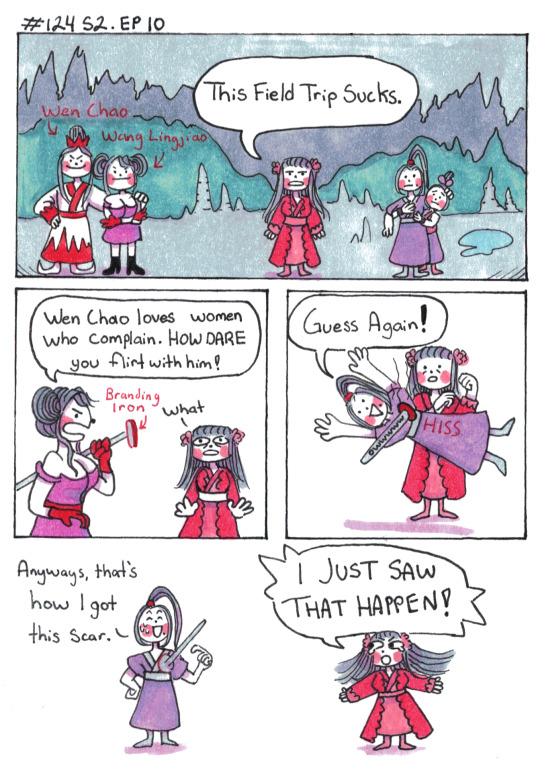
Call that a Cave Story.
[First] Prev <–-> Next
#poorly drawn mdzs#mdzs#wen chao#wang lingjiao#mianmian#wei wuxian#jiang cheng#I had to cut the comic with JC 'holding WWX back from fighting the Wen Assholes' but it is with me in spirit.#It reads (to me) a little bit like JC is scared of Core Melting Hand and wants to have an excuse to hold on to WWX for comfort.#As far as I can recall they are around 15-17 in this arc.#And a guy who can rip out your golden core? The thing we know JC truly puts so much weight upon that he feels meaningless without it?#Yeah that's pretty terrifying. I hope WWX hugs back (he will not)#I have a lot more thoughts on Wang Lingjiao and Mianmian but I will keep them for later.#WLJ is a character I feel got done a little dirty because she has a ton of interesting potential that gets pushed aside for Mean Villainess#Let's be fully honest. Wen Chao and Wang Lingjiao are *THE* characters the Protag of one of those 'Reincarnated as the villain!' stories#Set up to be assholes to the main character and meeting a horrible end in retribution.#Do you think MXTX thought about that? How Wen Chao is basically the original Shen QiugQiu?#Who's going to be the brave soul who writes A transmigrator in wen chao's body (accidently makes wwx fall in love with him) story?#Though If we are going with “any mxtx character sho dies transmigrates to another book” WHO is the transmigrator?#Hear me out. I think it should be Original Liu Qingge. I think he and wwx would make a funny duo and I want to see it so bad.#AND the contrast of womanizer Wen Chao VS 'What is a woman' LQG.
877 notes
·
View notes
Text
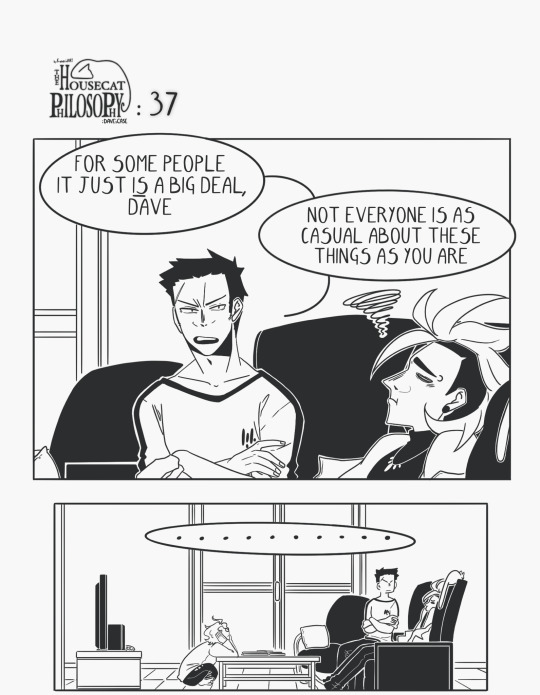

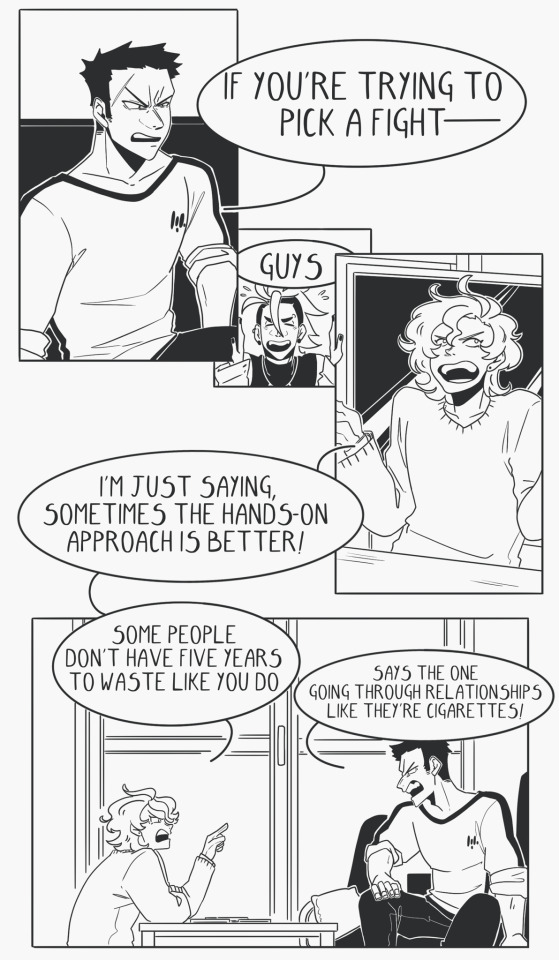

The Housecat Philosophy - Ep 37
Ep 00 || < Prev || Next >
Read the next four episodes on Patreon || support me on ko-fi~✨
#the housecat philosophy#artists on tumblr#original comic#webcomic#original art#my sketches#ah i love writing sal and lu in the same place#can't wait to get deeper into them they have probably the most ridiculous relationship i've ever made up#anyway as a psa#i was actually hoping to post this one with an announcement that the comic was finally on webtoon but!!#the process of prepping it for the site is turning out to be surprisingly long ????#apparently my meant to be read top to bottom comic is too meant to be read top to bottom for the read top to bottom site#i've drawn panels that were nearly too long for the max length allowed by the site hahaha........#wow cropping strip 38 is gonna be a nightmare#ANYWAY just to let you all know im working on it#who would have thought letting 37 strips pile up would mean having 37x the work to do not me that's for sure#i absolutely did not call this upon myself in no way whatsoever
428 notes
·
View notes
Text


#obikin#sorry not sorry but this is immediately what i thought upon reading that passage#i made this
3K notes
·
View notes
Text
I got Death Note HTR13 recently and reading it made me realize how there's barely any thematic meaning put into this story intentionally. Same with political commentary. Even (most of) the discussion around morality. Everything remotely intellectual ppl discuss about this series isn't a conscious decision, to a point that both Ohba (creator/writer) and Obata (artist), admit they were surprised by how much ppl had to say and analyze abt it.
Example of what I mean:

Also during the interview sections, there's so many instances of Obata asking Ohba what his creative vision was for this and that and Ohba just nonchalantly admitting he barely put any thought into the story beyond "oh this would be cool" or "oh this kinda fits the vibe".
There's a whole page of the interview where Obata is befuddled how the apples didn't have any intended symbolism behind them after Ohba tells him they were purely an aesthetic choice. Obata is so shocked by this (bc he knows apples are a common religious motif in art) he actually keeps asking Ohba if he's joking, while Ohba keeps stressing he's being serious. (Context: they never interacted while working on Death Note, they only spoke through their editor who'd rely production notes)
Obata for like three pages during his interview with Ohba in HTR13, after Ohba told him apples had no symbolic or thematic meaning in Death Note:

#EDIT: upon further reflection I think it's likely that in some segments Ohba was being humble or vague for privacy reasons#I just wanted to clarify that I no longer think that DN is a happy accident entirely! There was clearly still thought put into it.#(but a lot of it still very much feels like a happy accident at least imo)#death note#death note 13: how to read#tsugumi ohba#takeshi obata#💬 katposts#🤪 sillygoofy#analyses&meta
324 notes
·
View notes
Text
Some would rebut that “Oppenheimer,” being a Hollywood blockbuster with serious global reach (whether it will play Japanese theaters remains uncertain), will be many audiences’ only exposure to the events in question and thus might “create a limit on public consciousness and concern,” as the poet, writer and professor Brandon Shimoda told The Times. A corollary of this argument: The crimes committed against the people of Hiroshima and Nagasaki were so unspeakable, so outsized in their impact, that Oppenheimer’s perspective does and should dwindle into insignificance by comparison. For Nolan to focus so exclusively on an American physicist’s story, some insist, ultimately diminishes history and humanity, even as it reinforces the Hollywood hegemony of the great-man biopic and of white men’s narratives in general.
I get those complaints. I also think they betray an inherent disrespect for the audience’s intelligence and curiosity, as well as a fundamental misunderstanding of how movies operate. It’s telling that few of these criticisms of perspective were leveled at “American Prometheus” when it was published in 2005, that no one begrudged Bird and Sherwin for offering a meticulously researched, morally ambivalent portrait of their subject’s life and consigning the destruction of two Japanese cities to a few pages. That’s because books are books, the argument goes, and movies are movies — and this perceived difference, it must be said, reveals a pernicious double standard.
Because they seldom achieve the narrative penetration and richness of detail of, say, a 700-page biography, movies, especially those about history, often are hailed as achievements of breadth over depth, emotion over intellect. They are assumed to be fundamentally shallow experiences, distillations of real life rather than sharply angled explorations of it, propelled by broad brushstrokes and easy expository shortcuts, and beholden to the audience’s presumably voracious appetite for thrilling, traumatizing spectacle. And because movies offer a visual immediacy and narrative immersion that books don’t, they are expected to be sweeping if not omniscient in their narrative scope, to reach for a comprehensive, even definitive vantage.
Movies that attempt something different, that recognize that less can indeed be more, are thus easily taken to task. “It’s so subjective!” and “It omits a crucial P.O.V.!” are assumed to be substantive criticisms rather than essentially value-neutral statements. We are sometimes told, in matters of art and storytelling, that depiction is not endorsement; we are not reminded nearly as often that omission is not erasure. But because viewers of course cannot be trusted to know any history or muster any empathy on their own — and if anything unites those who criticize “Oppenheimer” on representational grounds, it’s their reflexive assumption of the audience’s stupidity — anything that isn’t explicitly shown onscreen is denigrated as a dodge or an oversight, rather than a carefully considered decision.
A film like “Oppenheimer” offers a welcome challenge to these assumptions. Like nearly all Nolan’s movies, from “Memento” to “Dunkirk,” it’s a crafty exercise in radical subjectivity and narrative misdirection, in which the most significant subjects — lost memories, lost time, lost loves — often are invisible and all the more powerful for it. We can certainly imagine a version of “Oppenheimer” that tossed in a few startling but desultory minutes of Japanese destruction footage. Such a version might have flirted with kitsch, but it might well have satisfied the representational completists in the audience. It also would have reduced Hiroshima and Nagasaki to a piddling afterthought; Nolan treats them instead as a profound absence, an indictment by silence.
That’s true even in one of the movie’s most powerful and contested sequences. Not long after news of Hiroshima’s destruction arrives, Oppenheimer gives a would-be-triumphant speech to a euphoric Los Alamos crowd, only for his words to turn to dust in his mouth. For a moment, Nolan abandons realism altogether — but not, crucially, Oppenheimer’s perspective — to embrace a hallucinatory horror-movie expressionism. A piercing scream erupts in the crowd; a woman’s face crumples and flutters, like a paper mask about to disintegrate. The crowd is there and then suddenly, with much sonic rumbling, image blurring and an obliterating flash of white light, it is not.
For “Oppenheimer’s” detractors, this sequence constitutes its most grievous act of erasure: Even in the movie’s one evocation of nuclear disaster, the true victims have been obscured and whitewashed. The absence of Japanese faces and bodies in these visions is indeed striking. It’s also consistent with Nolan’s strict representational parameters, and it produces a tension, even a contradiction, that the movie wants us to recognize and wrestle with. Is Oppenheimer trying (and failing) to imagine the hundreds of thousands of Japanese civilians murdered by the weapon he devised? Or is he envisioning some hypothetical doomsday scenario still to come?
I think the answer is a blur of both, and also something more: In this moment, one of the movie’s most abstract, Nolan advances a longer view of his protagonist’s history and his future. Oppenheimer’s blindness to Japanese victims and survivors foreshadows his own stubborn inability to confront the consequences of his actions in years to come. He will speak out against nuclear weaponry, but he will never apologize for the atomic bombings of Japan — not even when he visits Tokyo and Osaka in 1960 and is questioned by a reporter about his perspective now. “I do not think coming to Japan changed my sense of anguish about my part in this whole piece of history,” he will respond. “Nor has it fully made me regret my responsibility for the technical success of the enterprise.”
Talk about compartmentalization. That episode, by the way, doesn’t find its way into “Oppenheimer,” which knows better than to offer itself up as the last word on anything. To the end, Nolan trusts us to seek out and think about history for ourselves. If we elect not to, that’s on us.
#WOE WALL OF TEXT BE UPON YE#I thought this piece was really good 😭#and I thought the Oppenheimer movie was pretty good 😭 embarrassing! oh well#reading#oppenheimer#I just think this writing in particular is making a lot of points generally about film viewing that I’m like yeah! YEAH!#all the ideas around respecting the audience’s reading capabilities like YEAH
495 notes
·
View notes
Note
What is the best looking ant? The most beautiful good looking ant of them all?
(If you need ideas let me know I have many)
Do I really have to pick just one? There’s so many good ones. I picked a favorite but I also have like 3 runner-ups and even more special mentions. Sorry you’re getting 4x as many ants as you asked for!
Anyways! Number one… the absolute winner in my heart… is Oecophylla smaragdina. They’re just so gorgeous and their color palette is perfect and they have such fun body shapes. I also love it when ant queens look significantly different than their workers. The contrast is so pretty


…aaand now for the runner ups! First we have the green headed ant, Rhytidoponera metallica. They remind me of jumping spiders with how shiny they are


Next up is the silver spiny ant, Polyrhachis schlueteri!!! These guys are literally perfect. They look like little drops of mercury. Maybe I’m just biased towards shiny silver as a metalworker, but there’s nothing about this species that isn’t gorgeous


And last but never least, we have Polyrhachis trapezoidea. I’m already an absolute sucker for yellow, and these guys pull it off so amazingly well. This ant looks like it shops as Sephora and I love that for her

Alright bestie now it’s your turn. I need to know your opinions on ant beauty RIGHT NOW!!!
#ants#ant#bug#bugs#insect#entomology#ty for the ask I love you#my first thought upon reading this was honeypot ants since they can literally be any color#but that’s cheating and there’s so many prettier ones anyways#some others species I highly considered were#Pheidole viserion and#meranoplus bicolor#and turtle ants just cause they’re endearing
312 notes
·
View notes
Text
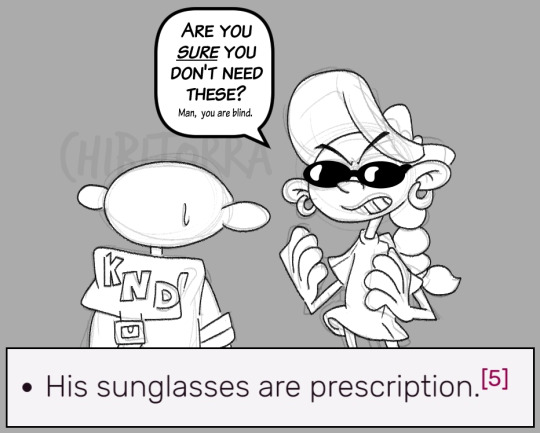
This was funnier in my head, I think.
#torras art#codename kids next door#knd#numbuh 1#nigel uno#numbuh 5#abigail lincoln#this was the first thought I had upon reading that piece from the wiki lmao#it's 4am I need to sleep
93 notes
·
View notes
Text
some thoughts on ‘if we were villains’.
before i begin, i warn you that this is not going to be a short post.
so, after two months, i finally finished “if we were villains”. for me, two months is a long time, despite the book having something of 400 pages. usually, i am able to get through a hundred of pages within a single evening, but that was not the case with this one. i would constantly read a maximum of 50 pages at best, only to close it shut and deciding to continue it on a different day.
the main reason behind this was truly none other than the magnificence of the descriptions of feelings in it. multiple times did i find myself unable to continue reading, sometimes even forced to take breaks worth days, because, while reading, i could nearly experience all the characters’ emotions myself, and sometimes the characters even expressed my own thoughts about the circumstances they were in.
leaving the general speech behind and moving on to more specific details, i cannot leave out the fact that, observing the dynamic between meredith and oliver, i could not help but feel uncomfortable - especially in the beginning, on the night of richard’s death and soon after it. never did i once experience such discomfort when any other couple was described - alexander and colin? marvellous. james and wren? excellent. james and oliver? stupefying, hell, not even meredith and richard made me feel like this (up until things started to get the way they got, of course), and i have yet to find a reasonable justification for this, except maybe for the fact that i, too, similarly to james, perceived the initiation, the start of all of this as “revenge-fucking”. i doubt my asexual identity is in any way linked to this, because i am mostly sex-indifferent. i have resorted to attributing this to the fact that, as we learn in the end, oliver had been and still is in love with james, while his situation with meredith, to me, really seemed like a typical case of being unable to tell the difference between romantic and aesthetic attraction.
what puzzled me further was the complete lack of participation in the story from wren’s side, and my confusion is only being reinforced by the fact that she is richard’s cousin. we barely get to see her at all, and every time we do, her participation is minimal. this i can attribute to her nature and her typecast as the ingénue, since typecasting clearly affects the characters quite considerably, but, even so, in my opinion, she deserved more than what she got.
now, regarding james’ motive in richard’s death - something i am most eager to talk about. as stated in the book, james did not have any intention to kill richard - in fact, he was ready to drag him out of the water, upon discovering that he was alive. and yet, something does not sit right. throughout the entire book, the idea that an actor’s thought process and feelings can easily get intertwined with those of the character they are portraying is commonly promoted, explicitly stated by both oliver and richard - in one of the prologues and during gwendolyn’s class respectively.
taking that into consideration and putting it aside for the time being, i remind that on the night of richard’s death it had been “caesar” that the seven were performing, with james having the role of brutus, and richard, inevitably, being caesar himself. in shakespeare’s play, the death of julius caesar is mainly attributed to the mastermind of the conspiracy, caius cassius, who wants caesar dead due to his own envy. knowing that “brutus is an honourable man”, cassius manipulates him by calling out to his sense of honour and getting him to conspire against caesar as well, allegedly for the benefit of rome, despite the fact that, originally, brutus had no personal conflicts with caesar.
seeing as james is stated and portrayed to have a difficulty snapping out of character - as clearly seen when he confesses his crime to oliver by speaking in verse exclusively - i pose this question; why is it not possible that on the night of richard’s death, having followed him into the forest, he found his own thoughts intermingled with his role’s to such an extent, where he consciously decided that the death of caesar (richard) would be for the benefit of rome (the six of them, mainly, but also anyone else)? essentially, what could have happened is that he, blinded by the thoughts of brutus and not his own, intentionally killed richard, believing it to be in everyone’s best interests.
of course, this did not happen, and, in my own view, because such a key (justification of james’ actions) would not open the door to the ending we eventually got; under no circumstances would oliver have forgiven james this easily, let alone taken all the blame upon him, if the death of richard was a result of “brutus” getting too caught up in his character. on the contrary, james acting out of pure terror justifies his actions in oliver’s eyes, especially seeing as “and who would keep him from drowning me this time?”. thus, we reach the ending that we currently have.
obviously, i am not claiming that my view of this is correct; it is but a mere speculation, one of the countless thoughts i had while reading. and, most of all, i am entirely not unsatisfied with the fact that i was wrong, and that richard’s murder was not intentional. to be entirely truthful, the justification given to james’ actions by me would most likely lead to a far more tragic and saddening end, and, honestly? i am glad m.l.rio’s explanation differs from mine this much. i don’t think i would have handled it if my theory had proven to be true, lol.
lastly, the decision of the author to end the book in the way she did. personally, i have never been an avid fan of open endings; i prefer it when authors give their pieces a definite ending, one that the audience has to get over and learn to live with. as, however, every rule bears an exception to itself, this time, i was rather relieved to receive an open ending, an opportunity to believe or denounce the survival of james.
and, myself? i believe james to be alive. in fact, this specific aspect i find myself to share with james; he uses the words of characters to speak the truth about himself, concealing it, so to say, behind the masks of roles in such a way that, if one does not seek a hidden meaning behind a verse seemingly spoken out of the blue, they are bound never to find it. as such, under no circumstances would he have otherwise chosen that specific speech of pericles, which had been pronounced, as remarked by oliver, before what would have been his death, “if he had not asked for help”.
with that, i conclude my train of thought. when starting this book, having read a maximum of forty pages, i had a clear outline of what i believed was going to unfold, and, though i was right about certain aspects (i.e. richard’s death i had predicted from act I, and james’ involvement in it - instantly upon seeing his reaction to richard choking on his blood in the water.), other ones i could never have foreseen, and that makes me more than happy. though this was a fantastic experience, i do confess that i cannot envision myself re-reading this book - at least not anytime soon. it’s true that, perhaps, now knowing the story, i may not be affected by it to such an extent, but i think, if only for the time being, i would rather keep it on my shelf, maybe occasionally quoting it, as i find myself doing with most of the media i indulge in.
also, alexander vass i declare top tier gender. the amount gender envy this man was giving me while i was reading is entirely ludicrous.
a playlist based on the book, in case anyone is interested.
#upon reading i thought#if we were villains#richard sterling#wren sterling#james farrow#oliver marks#meredith dardenne#filippa kosta#alexander vass#Spotify
29 notes
·
View notes
Text
leif is doing his best
(tube link with subtitles under the cut:)
youtube
#bug fables#bf#leif#leif bug fables#kabbu#vi#lotsa bug fable guys it's kinda an ensemble cast I'm not tagging them all </3#dragon doodles#my vids#animatic#rejoice! animatic be upon you#saw someone mention they read all of leif's lines with ice bear wbb's voice and it kinda went from there GFDHS#this took a while so I lay in the dirt now. more chitchatting in the yout description if you want rambly thoughts#I like leif :]#Youtube
989 notes
·
View notes
Text
dandelion: geralt — a moment ago, i spoke with a dryad in the common speech, she spoke without an accent, she told me . . .
geralt: you dreamed it, dandelion. this is brokilon. many things can be dreamed here.
dandelion: really?
geralt: of course. many strange and illusory things can be dreamed. for instance, i dreamed we had sex last night.
dandelion:
dandelion: that actually happened, though
geralt:
geralt: oh yeah. so it did
#go read time of contempt ch 5 if you didnt understand this#geralt x dandelion#gerlion#geraskier#geralt x jaskier#jaskier#time of contempt#mutuals dont watch me summon the dark forces with my tags alright#sorry this is so stupid but i thought of it and now everyone will just have to deal#woe. BOOK FANON be upon ye#return to book fanon where every gerlion shipper knows they had some kind of emotional reunion in august#the witcher books#book: time of contempt#because i wish to eat a third donut#s: i want to be by your side
437 notes
·
View notes
Text
i’m having so many emotions about teru
that was such a fast-paced, high-stakes situation, and he was thrown so many curveballs he barely had any time to cope with, and he still managed to adjust at impressive speed and never lost his faith in mob.
specifically: that moment right before ???% grabs him by the throat, when he’s kneeling on the ground trying to catch his breath. in that split moment, that’s when the realisation dawns, that this version of mob has no qualms in hurting him even with his bare hands. mob being non-violent to the point of letting himself get choked to unconsciousness was literally how they met, it’s one of the foundations at his core, and teru was well aware of it. having that knowledge suddenly be proven wrong, and all that means for his own safety, must have been a lot to take in. i can’t quite tell if it’s fear that we see on his face for a second, but if it is, that really adds to the element of horror - that sudden realisation that you’re in so much more danger than you thought and your initial plan is not going to be enough.
and then of course: when ???% lets loose his power despite so many people still being around and unable to evacuate. the horror on teru’s face, man. i don’t think it’d really clicked for him what mob being in this state actually meant until then. sure, him attacking teru was unlike him, but teru’s still an esper. he’s in great danger but he can somewhat defend himself. but civilians are different, and you can really tell teru did NOT think mob would put them in danger like that. he’s completely shell-shocked. i think that was another huge moment where he had to very quickly reassess the situation and what to do about it, all while coping with the emotional side of it all, since this is one of his closest friends and someone he really admires. he has to very quickly reckon with the fact that despite the pedestal he put him on, mob is just as human as he is and is capable of making mistakes just like everybody else, mistakes that don't detract from his worth.
which brings me to the point of it all. that DESPITE ALL THAT, teru was still able to 1) understand that mob desperately wants someone to stop him and would never want to harm anyone like this (bc he remembered that mob cried after realising what he’d done to his school....... where he’d only really harmed one person, who had done much worse to him..... if he cried after that, how will he feel when he finds out what he’s causing now?), 2) save all the people caught up in the devastation and get them all out of harm’s way, while being in a lot of pain (his EYES were BLEEDING), and 3) never once lose faith in mob. he saw him go on a (unintentional and unwilling, but teru doesn’t know that) rampage, doing things he would never in a million years think mob would ever do, and still took all of that in in record time considering the situation, and came out on the other side still whole-heartedly believing in shigeo and his goodness, and almost dying trying to stop him. because he knew that being the reason hundreds of innocent people got injured (or worse) would completely and utterly break mob.
and while, knowing teru, he might think he failed since he couldn’t achieve his goal (stopping mob’s rampage), what he succeeded in doing was ultimately just as important. he saved all the people he could, and gave his best for the one person he couldn’t.
#mob psycho 100#mp100#mp100 spoilers#hanazawa teruki#kageyama shigeo#this got really long but i have so many thoughts on this#there are some things i only brushed upon but that still drive me insane. but those will be for some other post maybe#the gist of this is that i think what teru was able to do here is an incredible feat that not many people could have done#both from a concrete point of view in terms of the people he saved and attempts he made at stopping mob#but also from a purely emotional perspective in terms of coping with all the life-altering curveballs being thrown at him#while being engaged in life-threatening battle#someone please get this kid to a hospital and then to a warm meal and a comfy bed or i'll do it myself#anyway thank you to bones for doing a great job with this final arc so far. excited for the next two eps#even having read the manga i'm NOT ready#post.txt
537 notes
·
View notes
Note
Babe wake up alex is shirtless in a tub and calling james vowles with a brick of ice
im frazzled but the alex noises….bellissimo
#this is the first thing i read upon waking up at 6:55am for qualifying and i thought i was hallucinating#asks#anon#alex albon
128 notes
·
View notes